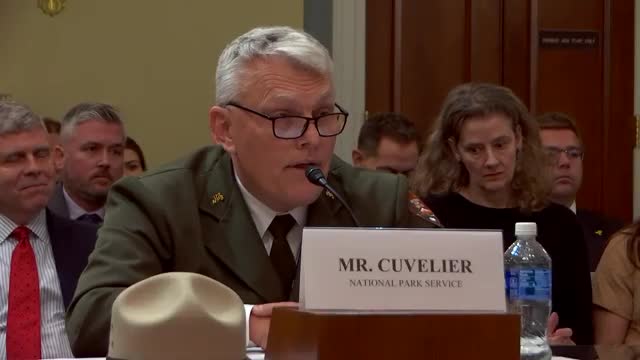Congressional hearing scrutinizes protest permit process amid concerns over violent groups
December 31, 2024 | Natural Resources: House Committee, Standing Committees - House & Senate, Congressional Hearings Compilation
This article was created by AI summarizing key points discussed. AI makes mistakes, so for full details and context, please refer to the video of the full meeting. Please report any errors so we can fix them. Report an error »

During a recent oversight hearing held by the U.S. House Committee on Natural Resources, significant discussions emerged regarding the permitting process for demonstrations and the management of public safety during these events. The meeting highlighted the ongoing efforts of the United States Park Police to improve their procedures and ensure the safety of both officers and the public.
One of the key topics addressed was the Park Police's approach to evaluating permit applications for demonstrations. Officials emphasized that each application is considered individually, without retaining records of past incidents involving specific individuals. This raises concerns about the ability to track repeat offenders or groups that may pose a threat during public gatherings. The need for a more robust intelligence system was underscored, with suggestions for a database to monitor individuals who have previously caused disturbances.
The conversation also touched on the challenges of balancing constitutional rights with public safety. A member of Congress, drawing from personal military experience, expressed frustration over the actions of protest groups that have disrupted public spaces. He questioned whether a history of illegal activity should influence the decision to grant demonstration permits, highlighting the complexities faced by law enforcement in maintaining order while respecting citizens' rights.
Additionally, the hearing revealed that the Park Police do not produce regular reports on gatherings that turn violent, relying instead on intelligence briefs that are generated based on current events. This lack of consistent reporting may hinder proactive measures to prevent violence at future demonstrations.
As these discussions unfold, the implications for community safety and the management of public demonstrations remain critical. The Park Police's commitment to improving their processes will be essential in addressing the concerns raised during the hearing, ensuring that both public safety and constitutional rights are upheld in the face of growing tensions at public events. The outcomes of this meeting may lead to changes in how permits are issued and how intelligence is gathered, ultimately impacting the community's experience during demonstrations.
One of the key topics addressed was the Park Police's approach to evaluating permit applications for demonstrations. Officials emphasized that each application is considered individually, without retaining records of past incidents involving specific individuals. This raises concerns about the ability to track repeat offenders or groups that may pose a threat during public gatherings. The need for a more robust intelligence system was underscored, with suggestions for a database to monitor individuals who have previously caused disturbances.
The conversation also touched on the challenges of balancing constitutional rights with public safety. A member of Congress, drawing from personal military experience, expressed frustration over the actions of protest groups that have disrupted public spaces. He questioned whether a history of illegal activity should influence the decision to grant demonstration permits, highlighting the complexities faced by law enforcement in maintaining order while respecting citizens' rights.
Additionally, the hearing revealed that the Park Police do not produce regular reports on gatherings that turn violent, relying instead on intelligence briefs that are generated based on current events. This lack of consistent reporting may hinder proactive measures to prevent violence at future demonstrations.
As these discussions unfold, the implications for community safety and the management of public demonstrations remain critical. The Park Police's commitment to improving their processes will be essential in addressing the concerns raised during the hearing, ensuring that both public safety and constitutional rights are upheld in the face of growing tensions at public events. The outcomes of this meeting may lead to changes in how permits are issued and how intelligence is gathered, ultimately impacting the community's experience during demonstrations.
View full meeting
This article is based on a recent meeting—watch the full video and explore the complete transcript for deeper insights into the discussion.
View full meeting